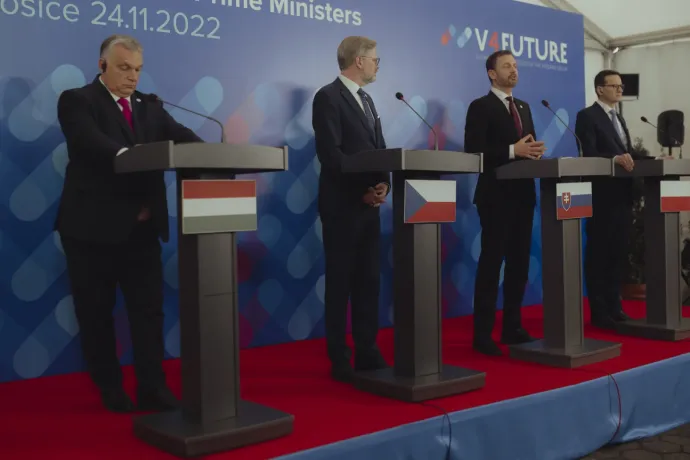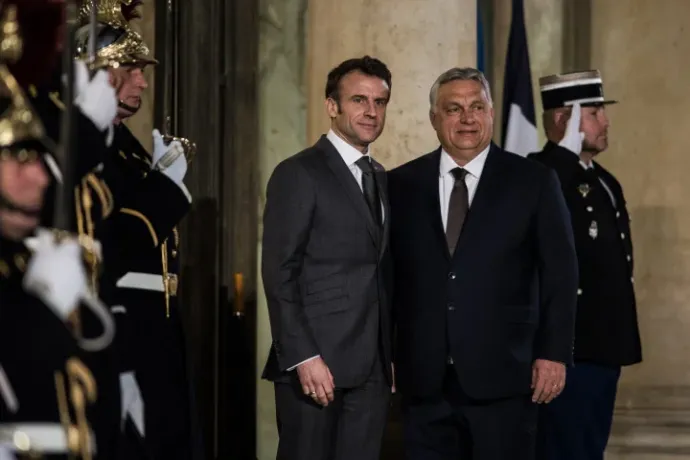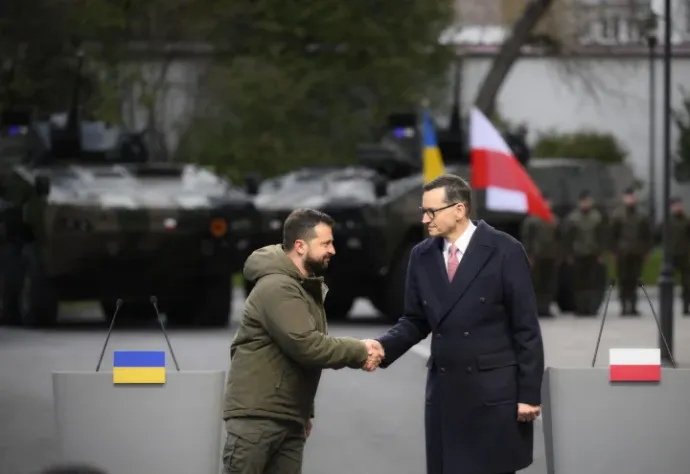Orbán had predicted Central Europe's rise. He ended up regretting it.

The rise of Central Europe’s influence within the European Union has been a recurring theme of Prime Minister Viktor Orbán’s foreign policy speeches in recent years.
“Central Europe is rising, getting stronger, becoming more influential. The center of growth within the whole European Union is shifting eastward, towards Central Europe. The EU is no longer solely about the German–French ‘axis’, relations between Western Europe and Central Europe are of key importance as well” – said Orbán in Slovenia in 2020.
To drive his point home, Orbán regularly stresses that Germany trades more with the ‘Visegrád Four’ – Hungary, Slovakia, Czechia and Poland – than with France, which in his telling signifies that the region is becoming the new engine of the European economy. His political director, Balázs Orbán (no relation) said that “our region is getting stronger in a political, cultural, and economic sense, while Western Europe is facing severe problems”.
These assertions are highly questionable. The thirteen member states which have joined the EU after 2004 represent a meager 11.8 percent of the EU’s Gross Domestic Product (GDP) and 23 percent of its population today. Their GDP share has risen only 2.2 percentage points, while their population share has declined by 0.9 percentage points over the last ten years.
Moreover, Orbán routinely fails to acknowledge that the economic relations between Central Europe and Germany are highly asymmetrical: the majority of trade between Germany and the region is made up of transactions between the headquarters and the regional subsidiaries of German multinational companies, which have outsourced their lower value-added production processes to the region to take advantage of cheap Central European labour.
Yet in spite of the limited economic influence of the region, the war in Ukraine has indeed shown that the dynamic between the West and the East in the EU is changing. The ‘Eastern’ member states have been punching above their weight in trying to influence the EU’s foreign policy,
and have successfully advocated for unequivocal support for Ukraine and a tougher stance against Russia, even though this meant locking horns with the more cautious German–French ‘axis’.
The irony is that rising Central and Eastern European influence within the EU, which Orbán had cheered on before the war, has become detrimental to his own foreign policy designs, and has significantly reduced his influence within the EU.
Orbán has been trying to remain ‘neutral’ in the conflict, maintaining relatively friendly relations with Russia and is still reluctant to reduce Hungary’s considerable reliance on Russian energy. While he has been cautious not to directly criticize Russian President Vladimir Putin, he and his cronies routinely blame the United States for fomenting instability in Europe and globally.

In sharp contrast to Orbán, the rest of Central European, Eastern European and Baltic EU members follow a tough line on Russia and remain staunch supporters of transatlantic defence ties. In this sense, Orbán finds himself more aligned with the dreaded German–French axis, especially with this former ideological rival, French President Emmanuel Macron.
Isolated
To the contrary of Orbán’s predictions, Central Europe and the Baltic states carved out an outsized role for themselves in EU decision-making not through economic strength, but by virtue of being right about Russia. Before the invasion of Ukraine, the hard-line stance of Poland and the Baltics had few supporters in Brussels; since the outbreak of the war, their purchase has increased significantly both in Europe and in the United States.
The voice of Central and Eastern Europe was augmented by an increasingly sophisticated understanding of EU politicking. The ‘new’ member states had spent their first decade in the EU more as followers and rule-takers, but over the past couple of years, they have become more adept at the art of coalition building in Brussels, which allowed them a bigger say in EU matters.
Another explanation for their more forceful demeanor lies in the urgency of the situation. For them, the war in Ukraine is an existential threat, and halting Russia’s advances and weakening its military power is essential for their national security. When France and Germany were hesitant to acknowledge this, they were quick to turn to the United States, partly to force the hands of their Western European partners. To this end, they have also found new allies in Finland, Sweden, and more hawkish Northern European partners, who were similarly alarmed by Russia’s advances – and similarly impatient with the French and German approach.
Orbán failed to join the fray, however. The Hungarian Prime Minister said that he does not believe that Russia represents a threat to Hungary, since Putin would not attack a NATO member state. He has refused to send arms to Ukraine or indeed allow the transfer of arms through Hungarian territory; criticized the US and his European allies for supplying Ukraine with weapons; asserted that Western sanctions levied on Russia do more harm to Europe than to Putin; and suggested that the war could end as soon as the West halts the flow of arms and aid to Ukraine.
The exact reasons behind Orbán’s stance remain a matter of debate among Hungarian foreign policy experts. Regardless, his defiance has pushed him to the sidelines of Central European and EU politics. The Polish governing party, the hawkish right-wing Law and Justice (PiS) was forced to renounce its friendship with Orbán and his Fidesz party, even though they have been brothers in arms in their ideological crusade against the supposedly ‘liberal’ EU institutions.

After Slovakia and Czechia had similarly derided Orbán, Hungary was effectively shut out from the Visegrád Four – an informal group which was reinvigorated in recent years by the Hungarian government as a forum for a common Central European voice and a vehicle to more effectively represent Hungarian interests in the EU.
Not all is lost for Orbán
This does not mean that the common interests of Hungary and the rest of the region have suddenly dissipated for good.
PiS’ efforts to undermine the rule of law and the independence of the judiciary have led to the suspension of EU funds and an on-going tussle with the European Commission. Orbán similarly stands accused of dismantling democratic checks and balances on his power and fostering corruption and state capture in Hungary. This means that PiS and Fidesz still need each other dearly to thwart the European Commission and the EU Council in levying further penalties on them. In addition, PiS and Fidesz remain ideological allies in their battle against deepening European integration and their aversion to ‘Western liberal values’, which they see as a threat to the ‘Central European way of life’, whatever that is supposed to mean.
It also remains to be seen if the Czech and Slovakian turn away from Orbán will prove to be durable. Apart from the Hungarian stance on the war in Ukraine, this was partly a result of domestic politics. Orbán enjoyed good relations with both former Czech Prime Minister Andrej Babiš and Robert Fico, the leader of SMER, the previous Slovakian governing party. Both of Orbán’s allies lost elections in recent years, and more liberal, and indeed decidedly anti-Orbán coalitions took power in both countries. A change in government in either of these countries could weaken Orbán’s isolation, and refocus their attention to their common interests.
Orbán’s trust in Russian energy has somewhat weakened these interests: even as the rest of the region is trying to diversify their natural gas and oil imports, Hungary remains a loyal customer of Russia, and has indeed become the largest user of Russian natural gas within the EU. The common reliance on Russian energy – a relic of the Cold War – had previously made many Central and Eastern European member states share Orbán’s caution with regards to sanctioning Russia. As the rest of the region quickly reduced its reliance, Hungary might find it harder to protect its energy interests in the future.
Yet recent events have also shown that common interests remain, and at times trump solidarity with Ukraine.
Over the weekend, Poland, then Hungary and Slovakia had suspended grain imports from Ukraine due to the lower price and supposedly lower quality of the Ukrainian product. While Poland moved to allow the transit of Ukrainian grain through its territory midweek, this episode has shown both the mounting indirect costs of the conflict and the appetite for policy coordination among the Visegrád countries.
There are also signs that Central Europe’s outsized role in driving the response to the invasion of Ukraine might come under strain from the West. Emmanuel Macron has sent shockwaves through the transatlantic foreign policy and defence establishment in recent weeks, as he renewed his calls for the EU to reduce its defence reliance on the US, struck a more forgiving tone towards Russia, emphasized the need for a prompt end to the hostilities in Ukraine, and declared that instead of decoupling from it, Europe should foster closer ties with China. While Macron was predictably derided in many European capitals, his words were very much in line with Orbán’s foreign policy.
Indeed, even though he had been cheering on the rise of Central Europe and decline of France for years, Orbán might have to wish for the resurgence of French influence after all.
For more quick, accurate and impartial news from and about Hungary, subscribe to the Telex English newsletter!